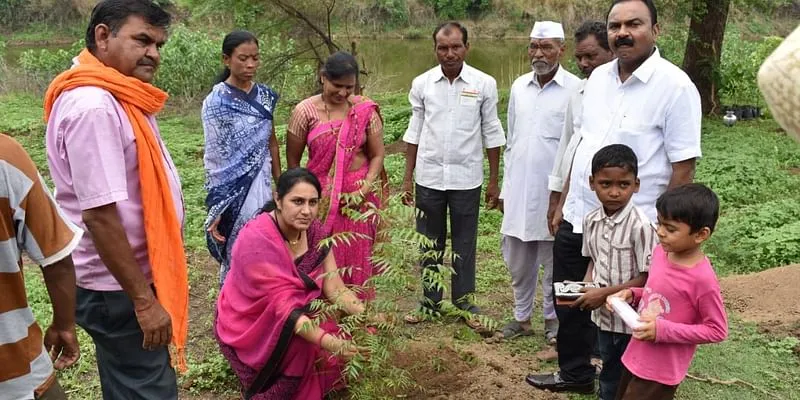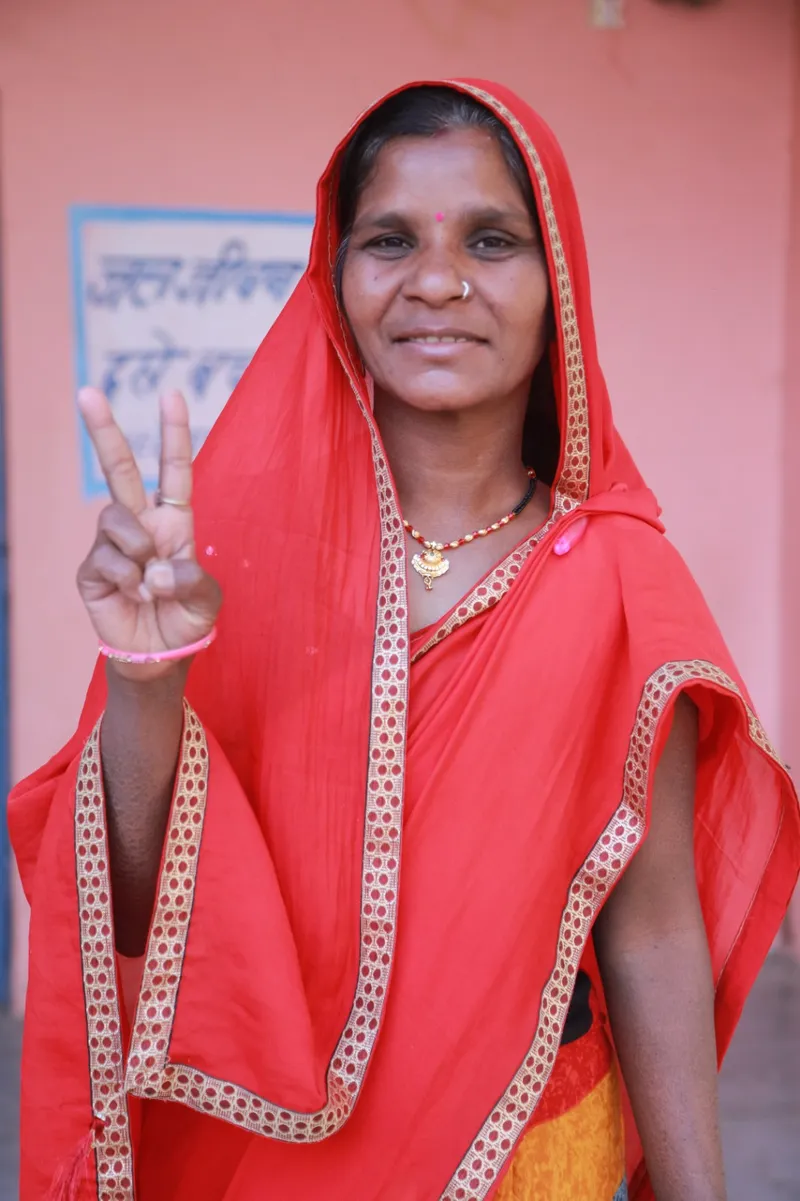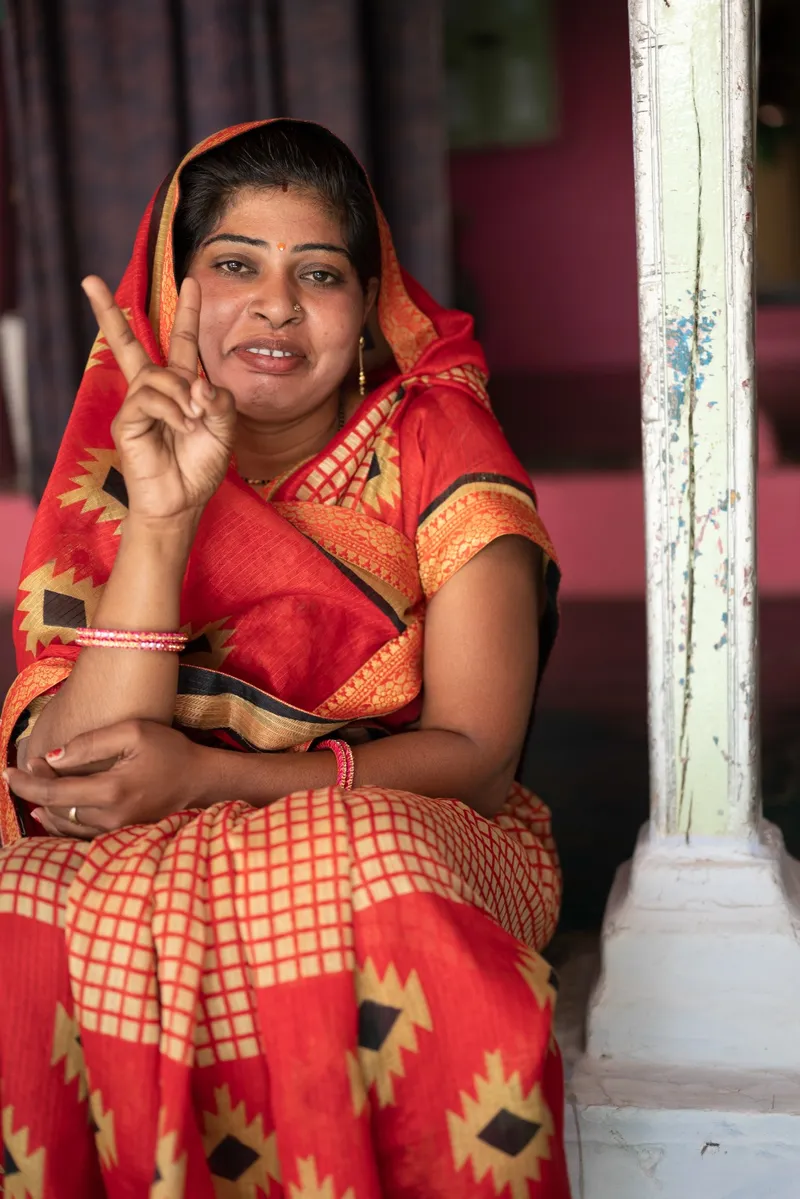Meet the Women Water Champions ensuring clean drinking water for their villages
Renuka Kotambkar, Ashatai Komtai, Babita Liroliya and Radha Meena are Women Water Champions, who with the help of WaterAid India, are helping their villages to access clean drinking water while raising awareness on good hygiene and driving sustainable change in their communities.
In some of the remotest villages in Madhya Pradesh and Maharashtra, groups of women are leading an important movement. One that will affect their lives and those around them in diverse ways.
Gone are the days when these women had to walk up to 4-5 km to source water from canals, run-down hand pumps, or rivers. These sources did not usually provide clean drinking water but they had to make do with whatever they could get, with no way of testing water for hardness or purity.
Things are now changing for the better.
Women are leading from the front to ensure access to clean drinking water, toilets, raising awareness on good hygiene, and are driving sustainable change in their communities.
WaterAid India, a not-for-profit organisation and part of the global WaterAid network, is training women as part of a project called Women + Water Alliance (“The W+W Alliance”) by USAID & Gap Inc. It is being implemented by WaterAid India in select regions of Maharashtra and Madhya Pradesh.
The project has a socio-economic aspect too – apart from awarding the women the title of Women Water Champions by UNDP, they have ensured that changes happen individually, and in the communities they serve.
All community initiatives are undertaken within project areas under the purview of the Jal Jeevan Mission of the Ministry of Jal Shakti.
VK Madhavan, Chief Executive, WaterAid India, told HerStory, “The Women + Water Alliance is a six-year Global Development Alliance (GDA) between USAID and Gap Inc. WaterAid India, a partner in this Alliance since 2019, has been committed to ensuring access to clean drinking water to communities in five districts in Madhya Pradesh (Sehore, Indore, Dhar, Dewas, and Khandwa) and two districts (Wardha and Yavatmal) in Maharashtra.”
The women changemakers are chosen through a series of continuous engagements at the community level.
Under this project, 13,834 women and youth were trained on water quality testing and use of field test kit (FTK); 4,067 women were trained on participatory planning and development of village action plan (VAP); 135 women were trained on water security planning and source sustainability; 4,634 women were trained to increase participation in gram sabha; and 184 women were trained as technocrats.
We spoke to a few Women Water Champions to understand their work and how their communities have been impacted by this project.
Renuka Kotambkar: Bringing about grassroots change

Renuka Kotambar planting a sapling
Even before she became the sarpanch of Kotamba village in Maharashtra’s Wardha District, Renuka Kotambkar had been rallying for the cause of potable water in the village.
“When I came to the village after I got married, the situation was such that women had to walk 2-3 km to source potable water. I rallied the women and asked the panchayat for hand pumps. Soon, we also had a public tap in the village,” Kotambkar recollects.
Seeing her concerted efforts, villagers asked her to run for elections to the sarpanch’s post, which she won successfully. Now in her second term, Kotambkar is leading many development initiatives in Kotamba.
With the support of the Women+Water Project, supported by WaterAid India and implemented by the National Institute of Women, Child, and Youth Development (NIWCD), there has been a major focus on rainwater harvesting structures built on all four government buildings in the village. Renuka also succeeded in getting all the 285 families in the village tap water connections under the piped water supply scheme.
She explains, “Over the years, we have learned the importance of conserving water. We were taught how to test water, based on eight parameters, to ensure it’s good enough to drink. We formed a committee of women to ensure that there is a flow of water to every household, collect jal tax, and make interventions whenever needed so that there’s no scarcity of water in the village.”
These efforts, coordinated by Kotambkar, pooled in government resources, individual funds and the collective efforts of the villagers. The sarpanch also assisted all economically disadvantaged households get a tap connection by allowing them to pay in instalments as low as Rs 50.
Kotambkar’s work has been recognised by the Maharashtra government with the Nirmal Gram Award, Ideal Sarpanch Award, Smart Village Award, and the Chhatrapati Award.
“It’s a feeling of pride for the village when we don’t face water shortage even during summer. Our plan is now to erect rainwater harvesting structures to benefit all households in the villages,” she says.
Ashatai Atmaram Komtai: Ushering in social change
Ten years ago, in Ashatai’s village, Shivani in Maharashtra’s Yavatmal district, women had to make multiple rounds to the agricultural fields to collect water every day.
“Since most of the women were doing the back-breaking work, I organised a women’s gram sabha meeting, through which the gram panchayat had to pass a resolution for a separate pipeline for the village,” she says.
Ashatai’s efforts paid off when she gathered the support of women in four villages, to make soak pits at the household level. With the guidance of the project team, she helped make 148 soak pits. In addition to this, she helped get sanction for the construction of 25 houses under the Pradhan Mantri Awaas Yojana- Gramin (PMAY-G), and the building of 25 household toilets.
She also motivated people for the construction of a well recharge structure. She now says “ab toh paani hi paani hai (there’s a lot of water)” and that teaming up with the WaterAid project has ushered in social change.
“Apart from learning how to conserve and test water, this project has helped us understand the importance of equality,” she says, adding, “Earlier, women were discouraged from attending gram sabha meetings. In fact, the birth of a girl was greeted with disappointment. Girls were married off at a young age. The project taught us about equality and how to participate in local governance,” she says.
Babita Liroliya: facing challenges, head-on

Babita Liroliya
The term, ‘water security’ made very little sense to Babita Liroliya of Nayapura village in Madhya Pradesh’s Indore’s district. However, as the only woman nominated to be part of the training programme in her village, she took the challenge head-on and led water conservation efforts in her village.
Today, Liroliya has been acknowledged as a Women Water Champion by National Water Mission, UNDP, and the Stockholm International Water Institute (SIWI) for her work at the grassroots level. Her main job is testing water quality and she has also been selected for a training session on hand pump repairing.
Liroliya is clearly excited about her work. She tells us how happy she was when she repaired a broken water pipe in the village.
“Though I worked with the National Rural Livelihood Mission (NRLM), I had no idea of water conservation. The project team taught me to test the water on all parameters, water storage, etc,” she says.
Soon, Liroliya was visiting every house in Nayapura village to ensure water is stored properly, kept out of the reach of children, and is used with tumblers with long handles. She also formed a group of 10 women to facilitate testing, draw a map for hand pumps and taps in the village, and make regular visits to households to ensure an unrestricted flow of water.
“We test the water before and after the monsoon to ensure it’s safe to drink. We visit different places and check for broken pipes and arrange for repairs immediately. We also teach others about pH testing and how water-borne diseases can be detrimental to the health of a community,” she says.
Radha Meena: Speaking up effectively

Radha Meena
A resident of Mahukala, a village in Sehore district, Madhya Pradesh, Radha Meena is a volunteer worker under the Women+Water Alliance programme and has been given many trainings on water issues under the project.
Meena’s husband died a year ago. Since then, she has been working in a factory and taking care of her children, as well as looking after the work of the tap water scheme in the village.
A total of 174 families resides in the village, and the drinking water system has being done through the Mardanpur Rural Water Supply Tap Water Scheme. Tap connections have been made to 143 families, which are getting clean and ample water.
“I helped in getting the Mardanpur Rural Group Water Supply Scheme approved by public lobbying. I also helped continuously monitor the testing, construction, and implementation of the scheme,” she says.
Meena helped in pipeline-related works such as installation of check valves at the right places, problem of leakage in all the taps, and other quality works.
She took her learnings to the field and taught others in the community about water security too. She encouraged women to participate in their meetings, and would, at times, use a loudspeaker to make her voice heard.
“Before 2019, women and people of the rural community were not getting enough and pure water, but today women are able to feed their families and are spending enough time with their children,” Meena says.
(The story has been updated to correct two typos)
Edited by Teja Lele







